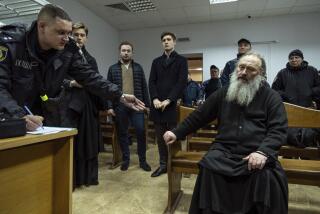Captors Free Catholic Prelate Seized in Mosul
- Share via
BAGHDAD — Almost as quickly as he was abducted, the Catholic archbishop of Mosul was released Tuesday in Iraq by unnamed kidnappers, and Vatican officials insisted that no ransom was paid.
Even as the priest was freed after an international outcry, a videotape surfaced showing what appeared to be eight Chinese construction workers being held by masked gunmen.
Msgr. Basile Georges Casmoussa, 66, who was seized Monday afternoon by gunmen near his church in the violence-racked northern Iraqi city, apparently was unharmed. Pope John Paul II, who had prayed for the safe return of the archbishop, said he was gratified at the “happy outcome.”
Kidnapping has reached almost epidemic proportions in Iraq as the United States and its Iraqi allies seek to rebuild the nation’s security forces, which were dismantled in the wake of Saddam Hussein’s ouster. The abductions have been used to obtain ransoms, make political points or both.
Iraqis as well as foreigners have been targeted. Many of the abducted have been killed; for some of those freed, millions of dollars purportedly were paid for their release.
On Tuesday, videotape of the construction workers arrived at news organizations with handwritten notes saying the men worked for a Chinese company inside U.S. installations in Iraq, news services reported. The abductors reportedly demanded that China explain why its citizens were working with the Americans.
Beijing’s official New China News Agency said diplomats were “making all efforts to rescue” the men, Associated Press reported.
The eight, from China’s southern province of Fujian, went missing last week while traveling to Jordan, the Chinese news agency said.
At the Vatican on Tuesday, the pope received news of Casmoussa’s release “with great satisfaction” and “immediately gave thanks to God,” spokesman Joaquin Navarro-Valls said in a statement.
“The kidnapping generated great surprise because the archbishop was admired by both Christians and Muslims,” Navarro-Valls said.
He said no ransom had been paid, despite reports from the MISNA Catholic missionary news agency that the kidnappers demanded $200,000.
Father Tetrus Mosei, the vicar general of the Mosul diocese, reportedly received a phone call Tuesday morning demanding the payment, the Catholic World News wire service reported. Catholics in Mosul were collecting funds for the ransom when they heard that Casmoussa had been freed, the agency said.
Casmoussa told Vatican Radio that he was not hurt, and he sought to minimize the sectarian overtones of his abduction in a nation riven by ethnic, religious and political divisions.
“I’m happy to have returned to the bishop’s office,” he said. “I can say that I wasn’t mistreated.... I think that my kidnapping was a coincidence. It doesn’t seem to me that they wanted to strike at the church per se.”
Though the archbishop was freed, a wave of violence and intimidation continued in the run-up to national elections scheduled for Jan. 30.
Car bombs rocked Baghdad shortly after dawn today, one outside the Australian Embassy in the central neighborhood of Jadiriya and the other near a police headquarters building.
The Australian Embassy complex, along busy Jamia Street, is heavily fortified. But the powerful explosion blew out windows more than a block away, raining debris onto the ground from several hotels and apartment buildings.
Early reports indicated that at least two people were killed and several injured. There was little traffic at the time.
A garbage truck and abandoned sedan sat disabled near the burning remnants of the car bomb, as U.S. troops cordoned off the scene and Apache helicopters roared overhead.
Australia is part of the U.S.-led coalition in Iraq and has been a strong backer of Bush administration policy in the country.
The second bomb appeared to target a police station east of downtown.
Reuters news agency quoted hospital officials as saying at least five people were killed and 36 wounded.
Additional details were not immediately available.
On Tuesday, Iraqi officials announced that the government would seal the country’s borders, extend a curfew and restrict movement to protect voters from insurgent attacks, news agencies reported.
Iraq’s borders will be closed from Jan. 29 until Jan. 31 to all except Muslims returning from the hajj, a pilgrimage to Saudi Arabia, Associated Press reported. During the same period, Iraqis will be barred from traveling between provinces and a nighttime curfew will be in place.
U.S. and Iraqi officials expect that attacks will accelerate as election day nears. Sunni Muslim insurgents opposed to the U.S.-backed Iraqi regime and its electoral plan have been attempting to disrupt the elections.
In other developments Tuesday, military officials said a U.S. soldier was killed by a roadside bomb in the Baghdad area. Another died while fighting in western Iraq. No further details were available.
Wilkinson reported from Milan, Italy, and McDonnell from Baghdad. Times special correspondent Roaa Ahmed in Mosul contributed to this report.
More to Read
Sign up for Essential California
The most important California stories and recommendations in your inbox every morning.
You may occasionally receive promotional content from the Los Angeles Times.














